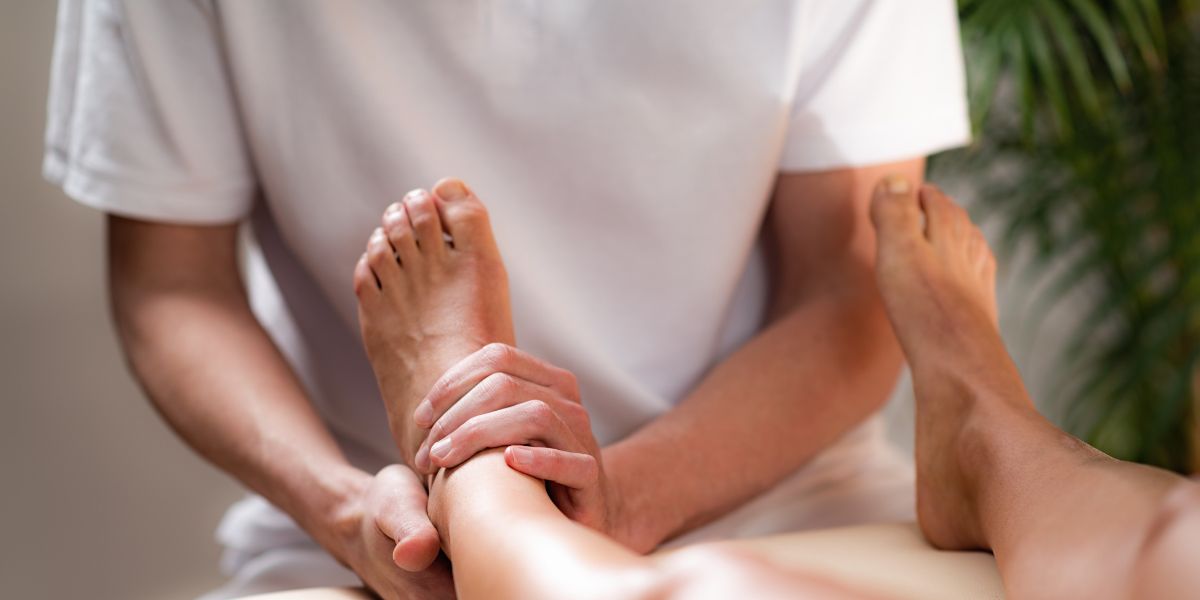Understanding Diabetes
- Sales Team
- Canonbury
- 12 Jun 2024

In this blog, we’ll explore the crucial link between diabetes and foot complications. We’ll provide practical diabetic foot care tips and useful advice on helping patients to choose the right shoes to reduce any complications that could be caused by diabetes.
How does diabetes affect the feet?
Diabetes and foot problems are closely linked due to the impact of high blood sugar levels on various parts of the body, particularly the feet. Diabetes can affect the nerves and blood vessels in the feet, leading to various complications. This is why good foot care is so important for those with diabetes.
Common foot problems with Diabetes
Neuropathy
Diabetes can damage the nerves in the feet, causing numbness, tingling, or loss of sensation. This can make it challenging to detect injuries or sores and dull pain perception. Some people experience burning or sharp, shooting pains in their feet due to neuropathy. These sensations can be uncomfortable and may worsen over time.
Poor Circulation
Diabetes can also affect blood circulation, leading to reduced blood flow to the feet. This can result in slower wound healing, as reduced blood flow means that wounds, cuts, or ulcers on the feet may take much longer to heal. Insufficient blood supply also impairs the body's ability to fight off infections, so even minor injuries can become infected and lead to more serious complications.
Blisters and Ulcers
The combination of neuropathy, poor circulation, and reduced pain perception can create a perfect storm for blisters and foot ulcers. A foot ulcer is an open sore that can develop from minor injuries, pressure points, or friction such as a blister. These ulcers can be difficult to heal and may lead to more severe infections or even amputation if left untreated.
Best practices for those with diabetes
Regular Foot Examinations
In addition to daily inspections, patients should have regular foot check-ups with a podiatrist who can identify potential issues early and provide guidance on maintaining healthy feet.
Moisturise Feet Carefully
Apply moisturiser to keep skin soft, but avoid putting too much between the toes. Excess moisture in this area can promote fungal infections. Pay close attention to areas such as cracked heels and choose a product that is specially formulated to treat dry skin or skin that is prone to cracking.
Dermatonics Heel Balm Manuka contains Manuka honey from New Zealand that hydrates and draws moisture into the skin, making it ideal for people with very dry feet.
Proper Nail Care
Trim toenails straight across to avoid ingrown nails. Those who have difficulty seeing or reaching thier feet should seek professional help for nail care. Our range of nail clippers and nippers make keeping your nails trim and shapely easy and hassle-free: Nail clippers & nippers.
If nails are damaged, flaky or distorted consider treating them with a diabetes friendly nail oil such as the Mykored Nail Protection Oil to improve their overall condition.
Avoid Blades for Corn Plasters
Patients should not use blades or sharp objects to remove corns or calluses. Diabetes can cause reduced sensation in the feet making it harder to feel pain. Using blades or sharp tools can result in accidental cuts or wounds that may go unnoticed and lead to an infection.
Wear the Right Socks
Seamless socks made from non-compression materials will prevent friction and reduce the risk of blisters. Avoid tight or restrictive socks that could impair circulation.
Avoid Barefoot Walking
People should avoid going barefoot, even indoors. Wearing shoes or slippers can protect feet from injuries and sharp objects that may be lurking on the floor. The Dr Comfort range of Diabetic friendly slippers are designed to support your feet while keep them cosy and safe, making them ideal for sensitive feet: Dr Comfort.
Choose Diabetes-Friendly Shoes
When looking for footwear, prioritise comfort and support above all. Look for cushioning in the sole and heel to absorb shock and ensure the shoes have proper arch support to maintain your foot alignment. Also, opt for shoes with enough toe room to prevent painful pressure points. Dr Comfort footwear and accessories are particularly suitable for patients living with diabetes.
Check Shoes Before Putting on
Before putting on shoes, patients should inspect them for any foreign objects, rough edges or stones that might cause irritation or injury.
Gradually Break-In Shoes
New shoes should be worn for short periods initially to ensure they don't rub or cause blisters. It is important to ensure they provide adequate support and comfort and consider adding an orthotic insole to for a customised fit if required.
Proper Wound Care
Patients should seek medical attention if they notice a cut, blister, or sore on the foot, no matter how minor it may seem. Diabetic foot ulcers can develop rapidly and require specialised care.
Control Blood Sugar Levels
Blood sugar levels should be within the target range recommended by the patients healthcare provider. High blood sugar can damage nerves and blood vessels, increasing the risk of foot problems.
Healthy Lifestyle Choices
Patients should maintain a balanced diet and engage in regular physical activity to manage weight and improve blood circulation. Smoking should be avoided.
Elevate Your Feet
Elevating feet when sitting or lying down can help reduce swelling and improve blood flow. It's especially beneficial for those with issues like swelling or edema.
Foot Exercises
Simple exercises, such as ankle rolls and toe stretches, can improve circulation and flexibility in the feet. A healthcare provider can reccomend specific exercises tailored to each patients needs.
Regular Foot Massages
Gentle foot massages can stimulate blood flow and provide relief from discomfort or pain. Be sure to use a moisturiser or lotion to prevent dryness such as the Bare Feet by Margaret Dabbs Conditioning Foot Cream.
Keeping Hydrated
Drinking enough water helps maintain skin elasticity and overall foot health. Proper hydration can reduce the risk of skin cracking and drying out.
Visiting our sister website simplyfeet.com
Patients can support their daily diabetes foot care routine by visiting our Simply Feet website, it has a range of specialised products designed to care for and treat diabetic feet, ensuring they stay in excellent condition.






